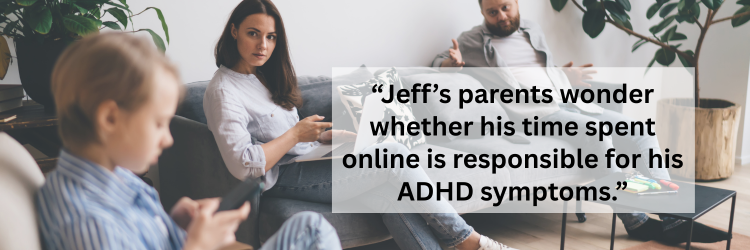Does Screen Time Cause ADHD in Children?
As a clinician who evaluates for ADHD as a major component of my practice, a common question I’m asked by parents is whether screen time ‘causes’ ADHD in children.
The Case of Jeff
Jeff* is a bright, capable, and likable 6th grade student who has lots of friends and talents in many areas outside of school (sports, music).
This year, Jeff’s grades have gone down. He is having a hard time keeping up with the workload. His self-esteem is declining. His parents are frustrated with him and, even more so, he is upset with himself.
Jeff spends multiple hours a night on his phone and on his gaming console. The hours quickly melt away. He is not getting his work done. He goes to bed too late. He is exhausted the following day. The next night the cycle continues. His parents have a hard time getting him off his devices, and he pushes back.
Jeff, In addition, shows In addition, Jeff shows indications of ADHD, the typical signs of which include:
Having limited focus on tasks of priority (e.g., schoolwork)
Being easily distracted
Not following through on things
Being scattered/disorganized
Routinely making careless mistakes
Jeff’s parents wonder whether his time spent online is responsible for his ADHD symptoms.
Supporting Data for Screen Time Leading to ADHD
Several studies suggest the possibility that excessive screen time, particularly in the younger years, can lead to a higher likelihood of future ADHD.
One study showed that children who spend more time on screens had 7.7 times greater odds of meeting the criteria for an ADHD diagnosis. Excess screen time even outranked other major factors that can cause attention problems, including lack of proper sleep, social and economic status, and parents’ stress.
Another study found preschool children who had ADHD watched more than the 1 hour per day recommended for 2- to 4-year-olds by the World Health Organization (WHO).
So… Do Screens Actually Cause ADHD?
The results above don’t necessarily mean screen time itself causes the attention problems. Many other factors may help explain some of these findings:
Screen sessions can take away time from developing persistence and learning to cope with failure.
Screen time activity can “tempt” more susceptible kids away from more important activities (other hobbies, exercise, socialization).
Boredom can drive screen-seeking. Watching can become a go-to habit that becomes an addiction.
Put another way… it may be that screens can worsen the situation for those susceptible to, or already suffering from, ADHD.
How Do Screens Impact Attention?
Those with short attention spans already have limited capacity to handle feelings of boredom.
For these individuals, there is an endless need for mental stimulation.
Screens provide immediate gratification and reward. They stimulate in ways that are constantly changing and at a fast pace.
Electronics cause the release of dopamine — a neurotransmitter and pleasure chemical in the brain.
Excess Screen Time for Those Already With ADHD
The impact of excessive screen time for those who already have ADHD is significant — and harmful.
Studies indicate that, for these individuals:
Screen time makes ADHD symptoms worse.
It negatively impacts their mental health (increased levels of anxiety/depression and lower self-esteem).
It worsens their behaviors (frustration, anger, lashing out, etc), impacting family relations.
It interferes with school responsibilities and participation in exercise and other important outside activities.
It often leads to sleep problems.
Jeff’s Journey, Revisited
Jeff’s parents wanted to know whether he did in fact suffer from ADHD and what to do about it.
Jeff’s parents were interviewed, and he eventually underwent a full educational and neuropsychological evaluation.
Jeff was eventually diagnosed with ADHD, along with anxiety and weak organizational skills (i.e., executive dysfunction).
Following the testing, a treatment plan was put in place. Recommendations included tutoring and professional organizational training. He was provided with accommodations within the classroom.
It was also recommended that the parents work with Jeff to help decrease the time spent on devices, specifically:
Screens only permitted once all homework is completed
Limits on the number of hours spent
Encouraging ‘unplugged’ and unstructured activities
Encouraging exercise
(Working with a therapist to help curb addiction, as necessary)
Outcome
About nine months after Jeff was evaluated, the family was contacted for an update.
Recommendations were followed through on, and though they took several months to fully resonate, Jeff is doing much better now.
Since being tested, Jeff’s grades have gone back up to where they had always been. He seems more energetic. He has become more organized. The success he feels in school has spread to and boosted his overall confidence.
Jeff, of course, still loves his ‘online’ time, and his parents understand that a certain amount of time spent on screens is normal and pleasurable.
However, the amount of time spent is now better controlled. Family relations have improved as well. With an understanding of limits to screen time among all members, there is less shouting, arguing, and stress among all members of the family. Everyone seems happier and relieved to have some tough times behind them.
To book a testing appointment or to speak further about my services, please feel free to contact me at 973-908-4860 or you can fill out our contact form here.
* All client names have been changed





